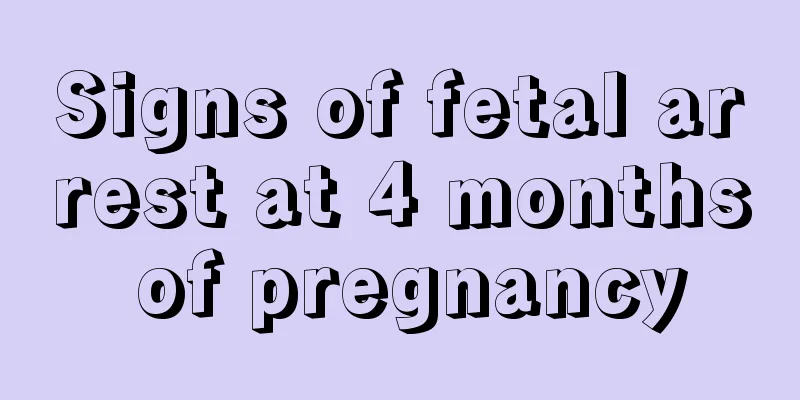What are the precautions and dietary taboos during menstruation?

|
Menstruation is a normal physiological phenomenon that occurs every month. Menstruation is very important for women. If menstruation is abnormal, it will not only affect physical health, but may also affect fertility. Women should take good care of their bodies during menstruation, whether in diet or life. If they do not pay attention, dysmenorrhea will occur. So what are the precautions and dietary taboos during menstruation? Menstrual period precautions and dietary taboos 1. Precautions during menstruation 1. Do not have sex During menstruation, the cervix is slightly open. Sexual intercourse during menstruation can easily bring bacteria from the vulva and perineum into the vagina, cervix, and even into the uterus, causing endometritis or acute adnexitis and pelvic peritonitis. In addition, sexual intercourse during menstruation may also cause the shed endometrium to flow back into the pelvic cavity and cause endometriosis. The above symptoms may cause increased menstrual bleeding, prolonged menstrual period, dysmenorrhea and other consequences. 2. Avoid strenuous exercise It is not absolutely forbidden to exercise during menstruation, but strenuous exercise such as high jumping and running should be avoided as much as possible, otherwise it will aggravate the discomfort during menstruation, such as back pain, and even cause dysmenorrhea and menstrual disorders. Swimming during menstruation should be avoided because the cervix is slightly open during menstruation, making it easy for bacteria to invade the uterine cavity, increasing the chance of infection and causing various gynecological inflammations. Therefore, do not swim during menstruation. 3. Avoid eating raw, cold or overly salty food Eating raw or cold food or drinking cold drinks during menstruation will affect the contraction of the uterus, causing poor menstrual blood discharge and leading to problems such as dysmenorrhea. In addition, during menstruation, many women tend to become irritable and anxious due to the imbalance of estrogen and progesterone, water and sodium retention, and excessive antidiuretic hormone. Eating too much salty food will aggravate water and sodium retention, leading to problems such as headaches and edema. 4. Avoid drinking alcohol, strong tea or coffee During menstruation, the proportion of alcohol-degrading enzymes in women's bodies decreases, and their ability to break down alcohol also decreases accordingly. Drinking a lot at this time not only makes you drunk more easily than usual, but the alcohol is also difficult to excrete and stays in the body, causing harm. Strong tea and coffee contain high levels of caffeine, which can easily lead to dysmenorrhea, prolonged menstruation or excessive bleeding. At the same time, the tannic acid in tea combines with the iron in food in the intestines, thereby affecting iron absorption and causing anemia and other problems. 5. It is not advisable to take blood-activating and blood-stasis-removing drugs During menstruation, you should be careful when using blood-activating and blood-stasis-removing drugs, otherwise it will easily increase the amount of menstrual blood, and in severe cases even cause problems such as heavy menstrual bleeding or anemia. 6. It is not advisable to take a bath or hot spring bath Because the cervix is slightly open during menstruation, if the lower body is soaked in water, the pathogenic bacteria in the water can enter the uterine cavity through the vagina and cause inflammation. In addition, the cervix is not completely closed within three days after the end of menstruation, so it is not advisable to take a bath during this period. 7. Don’t beat your waist or pull out your teeth Many women experience back pain during menstruation and often beat their waists out of habit to relieve the symptoms. The vibration stimulation caused by beating the waist during menstruation is not conducive to the repair of the endometrium. It will also cause further congestion and accelerated blood flow in the pelvic cavity, resulting in increased menstrual volume, menorrhagia or prolonged menstruation. If you still have back pain after your period ends, you may have gynecological diseases such as pelvic inflammatory disease and cervicitis. It is recommended that you seek medical diagnosis. Tooth extraction is not recommended during menstruation. In order to allow menstrual blood to be discharged smoothly, the number of platelets in a woman's body will decrease, so the blood coagulation ability is lower than usual. Tooth extraction at this time will cause more bleeding, easily lead to infection, and make the wound difficult to heal. What foods should women not eat during menstruation? 1. Cheese Cheese is the root cause of menstrual cramps. Foods such as milk, cheese, cream, yeast milk, eggs, etc. can destroy the absorption of magnesium and cause dysmenorrhea. 2. Caffeinated beverages Caffeine can cause breast tenderness, anxiety, irritability, and mood swings. It also consumes the body's stored vitamin B and disrupts carbohydrate metabolism. 3. Chocolate Chocolate can cause more unstable moods and sugar cravings. In addition to making you fat, it also consumes vitamin B in the body. 4. Sugar will consume vitamin B and minerals in the body and make the human stomach more fond of eating sugary foods. 4. Wine Alcohol will consume vitamin B and minerals in the body. Too much alcohol will disrupt carbohydrate metabolism and produce excessive estrogen. |
<<: How painful is it to give birth naturally for the first time?
>>: How long does it usually take for the lochia to be discharged after a normal birth?
Recommend
Half-month talk on Chinese medicine | Trachelospermum officinale
The green trunk of the rock is slanted Trachelosp...
Wearing pajamas VS sleeping naked, which is healthier? The truth is surprising
What is the happiest thing in a day? Of course it...
What to do if you have fatty liver during breastfeeding
Fatty liver is mainly caused by excessive fat acc...
Can I drink beer if I have uterine fibroids?
People with uterine fibroids should pay attention...
Does a 25-day menstrual cycle make you age faster?
Under normal circumstances, a woman's menstru...
Standard table of fetal development at each week
During pregnancy, mothers should be most concerne...
Jaw bone grinding process
In pursuit of beauty, many women undergo surgery ...
Postpartum vulvar bulging pictures
Postpartum vulvar prolapse may be caused by vagin...
Causes of fishy vaginal odor
Many married women suffer from gynecological dise...
What are the symptoms of vulvar leukoplakia
People always have to go through a lot of thing...
Is milk powder good for women's skin?
When it comes to baby formula, we all know that i...
How to fillet fish without bones when boiling it? Should I use high or low heat when boiling fish?
When boiling fish, the amount of water should not...
What is the normal progesterone level at 8 weeks?
Pregnant women should pay attention to the normal...
What foods contain progesterone?
If a woman has low progesterone after pregnancy, ...
Luotu Technology: China's online sales of color e-paper tablets will soar 297.8% year-on-year from 2024
With the arrival of 2024, the color e-paper table...









